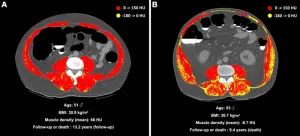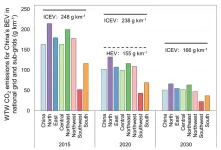(Press-News.org) A new paper published by leading Australian AI ethicist Stefan Harrer PhD proposes for the first time a comprehensive ethical framework for the responsible use, design, and governance of Generative AI applications in healthcare and medicine.
The peer-reviewed study published in The Lancet’s eBioMedicine journal details how Large Language Models (LLMs) have the potential to fundamentally transform information management, education, and communication workflows in healthcare and medicine but equally remain one of the most dangerous and misunderstood types of AI.
“LLMs used to be boring and safe. They have become exciting and dangerous,” said Dr Harrer who is also the Chief Innovation Officer of major Australian funder of digital health research and development, the Digital Health Cooperative Research Centre (DHCRC) and a member of the Coalition for Health AI (CHAI).
“This study is a plea for regulation of generative AI technology in healthcare and medicine and provides technical and governance guidance to all stakeholders of the digital health ecosystem: developers, users, and regulators. Because generative AI should be both exciting and safe.”
LLMs are a key component of generative AI applications for creating new content including text, imagery, audio, code, and videos in response to textual instructions. Prominent examples scrutinised in the study against ethical design, release and use principles and performance include OpenAI’s chatbot ChatGPT, Google’s chatbot Med-PALM, Stability AI’s imagery generator Stable Diffusion, and Microsoft’s BioGPT bot.
The study highlights and explains many key applications for healthcare:
assisting clinicians with the generation of medical reports or preauthorization letters;
helping medical students to study more efficiently;
simplifying medical jargon in clinician-patient communication;
increasing the efficiency of clinical trial design;
helping to overcome interoperability and standardisation hurdles in EHR mining;
making drug discovery and design processes more efficient.
However, the paper also highlights that the inherent danger of LLM-driven generative AI arising from the ability of LLMs to authoritatively and convincingly produce and disseminate false, inappropriate, and dangerous content at unprecedented scale is increasingly being marginalised in an ongoing hype around the recently released latest generation of powerful LLM chatbots.
A framework for mitigating risks of AI in healthcare
As part of the study, Dr Harrer identified a comprehensive set of risk factors which are of special relevance to using LLM technology as part of generative AI systems in health and medicine, and proposes risk mitigation pathways for each of them. The study highlights and analyses real life use cases of both, ethical and unethical development of LLM technology.
“Good actors chose to follow an ethical path to building safe generative AI applications. Bad actors, however, are getting away with doing the opposite: hastily productising and releasing LLM-powered generative AI tools into a fast-growing commercial market they gamble with the well-being of users and the integrity of AI and knowledge databases at scale. This dynamic needs to change,” said Dr Harrer.
Dr Harrer argues that the limitations of LLMs are systemic and rooted in their lack of language comprehension.
“The essence of efficient knowledge retrieval is to ask the right questions, and the art of critical thinking rests on one’s ability to probe responses by assessing their validity against models of the world. LLMs can perform none of these tasks. They are in-betweeners which can narrow down the vastness of all possible responses to a prompt to the most likely ones but are unable to assess whether prompt or response made sense or were contextually appropriate,” Dr Harrer said.
Therefore, he suggests that boosting training data sizes and building ever more complex LLMs will not mitigate risks but rather amplify them. The study proposes alternative approaches to ethically (re-) designing generative AI applications, to shaping regulatory frameworks, and to directing technical research efforts towards exploring methods for implementation and enforcement of ethical design and use principles.
Dr Harrer proposes a regulatory framework with 10 principles for mitigating the risks of generative AI in health:
design AI as an assistive tool for augmenting the capabilities of human decision makers, not for replacing them;
design AI to produce performance, usage and impact metrics explaining when and how AI is used to assist decision making and scan for potential bias,
study the value systems of target user groups and design AI to adhere to them;
declare the purpose of designing and using AI at the outset of any conceptual or development work,
disclose all training data sources and data features;
design AI systems to clearly and transparently label any AI-generated content as such;
ongoingly audit AI against data privacy, safety, and performance standards;
maintain databases for documenting and sharing the results of AI audits, educate users about model capabilities, limitations and risks, and improve performance and trustworthiness of AI systems by retraining and redeploying updated algorithms;
apply fair-work and safe-work standards when employing human developers;
establish legal precedence to define under which circumstances data may be used for training AI, and establish copyright, liability and accountability frameworks for governing the legal dependencies of training data, AI-generated content, and the impact of decisions humans make using such data.
“Without human oversight, guidance and responsible design and operation, LLM-powered generative AI applications will remain a party trick with substantial potential for creating and spreading misinformation or harmful and inaccurate content at unprecedented scale,” said Dr Harrer.
He predicts that the field will move from the current competitive LLM arms race to a phase of more nuanced and risk-conscious experimentation with research-grade generative AI applications in health, medicine and biotech which will deliver first commercial product offerings for niche applications in digital health data management within the next 2 years.
“I am inspired by thinking about the transformative role generative AI and LLMs could one day play in healthcare and medicine, But I am also acutely aware that we are by no means there yet and that, despite the prevailing hype, LLM-powered generative AI may only gain the trust and endorsement of clinicians and patients if the research and development community aims for equal levels of ethical and technical integrity as it progresses this transformative technology to market maturity.”
Comments on this research
“The DHCRC has a critical role in translating ethical AI into practice,” said DHCRC CEO Annette Schmiede. “There is a newfound enthusiasm for the role of generative AI in transforming healthcare and we are at a tipping point where AI will start to become ever more integrated into the digital health ecosystem. We are on the frontline and frameworks like the one outlined in this paper will become critical to ensure an ethical and safe use of AI.”
“Ethical AI requires a lifecycle approach from data curation to model testing, to ongoing monitoring. Only with the right guidelines and guardrails can we ensure our patients benefit from emerging technologies while minimizing bias and unintended consequences,“ said John Halamka, M.D., M.S, President of Mayo Clinic Platform and a co-founder of CHAI.
“This study provides important ethical and technical guidance to users, developers, providers, and regulators of generative AI and incentivizes them to responsibly and collectively prepare for the transformational role this technology could play in health and medicine,” said Brian Anderson, M.D., Chief Digital Health Physician at MITRE.
END
New paper introduces ethics framework for use of Generative AI in healthcare
Framework for the responsible use, design, and governance of Generative AI applications in healthcare and medicine
2023-05-16
ELSE PRESS RELEASES FROM THIS DATE:
Accomplished molecular biologist to lead new group at MDI Biological Laboratory
2023-05-16
Halyna Shcherbata, Ph.D., will lead a new research group at MDI Biological Laboratory, in the Kathryn W. Davis Center for Regenerative Biology and Aging. Shcherbata's work has focused on regulatory and other roles of non-coding microRNA in gene expression and maintenance, and disorders such as muscular dystrophy and developmental delay. She is already developing new facilities for Drosophila melanogaster fruit flies on campus, returning an esteemed stand-in for human physiology to the Laboratory’s roster of animal models.
In her new lab on Maine's Mt. Desert ...
Muscle fat linked to higher mortality risk
2023-05-16
OAK BROOK, Ill. – Asymptomatic adults with a high accumulation of fat in their muscles, known as myosteatosis, are at an increased risk of major adverse events and death, according to a study published in Radiology, a journal of the Radiological Society of North America (RSNA).
One of the methods used by physicians to estimate body fat in patients is the body mass index (BMI). Since BMI is calculated using only a patient’s height and weight, it’s not an accurate reflection of body composition ...
ChatGPT passes radiology board exam
2023-05-16
OAK BROOK, Ill. – The latest version of ChatGPT passed a radiology board-style exam, highlighting the potential of large language models but also revealing limitations that hinder reliability, according to two new research studies published in Radiology, a journal of the Radiological Society of North America (RSNA).
ChatGPT is an artificial intelligence (AI) chatbot that uses a deep learning model to recognize patterns and relationships between words in its vast training data to generate human-like responses based on a prompt. But since there is no source of truth in its training data, the tool can generate responses that are factually ...
MD Anderson awarded over $5.7 million from Break Through Cancer to support AML research
2023-05-16
HOUSTON – The University of Texas MD Anderson Cancer Center was awarded more than $5.7 million in grants from Break Through Cancer to support collaborative research teams working to discover novel molecular targets to eradicate minimal residual disease in acute myeloid leukemia (AML) and to treat clonal hematopoiesis, a precursor to AML.
MD Anderson received $2.7 million to fund research for the Targeting Clonal Hematopoiesis to Prevent AML TeamLab and $3 million for the Eradicating Minimal Residual Disease in AML TeamLab. The projects expand upon work initiated within MD Anderson’s Myelodysplastic Syndromes and Acute Myeloid ...
Magnetic stimulation may improve the pain, nausea of diabetic gastroparesis
2023-05-16
AUGUSTA, Ga. (May 16, 2023) – Magnetic stimulation of a group of nerves key to how our gut and brain communicate may help correct the conversation that goes awry in painful, debilitating diabetic gastroparesis, researchers say.
Patients come to Amol Sharma, MD, because their stomachs constantly hurt, they are always nauseous and they can’t or won’t eat or drink. Sometimes they can’t get out of the hospital because of nausea and vomiting.
“Gastroparesis is suspected in about 2% of the population, which is the about the population of Missouri, but only confirmed in .2% ...
Genetic analysis of Indigenous Taiwanese peoples sheds light on Austronesian expansion
2023-05-16
The Austronesian language family is one of the largest in the world, comprising over 1,200 languages spoken from Madagascar to Hawaii. Dang Liu, Albert Min-Shan Ko and Mark Stoneking collected genome-wide data from 55 individuals from seven Taiwanese Austronesian groups and two Han-Taiwanese groups to study the genetic structure of Taiwan, the point of origin for all Austronesian-speaking peoples. There are over 20 different Indigenous groups in Taiwan, divided into “highland” and “lowland” peoples. Many lowland peoples have intermarried with Han people, and their languages are endangered or extinct. ...
Emissions reductions of Chinese EVs
2023-05-16
Chinese electric vehicles (EVs) drive larger emissions reductions over time, due to increased operating efficiency and a greener electricity mix, according to a study. More than 10% of Chinese car sales are now electric, but the full life cycle of EVs still creates carbon emissions. Shaojun Zhang and colleagues conducted “cradle-to-grave” life cycle assessments for EVs in 2015 and 2020, including fuel-cycle and material-cycle phases, and compiled life-cycle projections for 2030. The authors considered factors including sources of electricity, vehicle fuel economy, major automotive metals, and battery ...
Cognitive training helpful for some but not a panacea for fall prevention
2023-05-16
INDIANAPOLIS – One out of four adults, age 65 or older, falls every year in the U.S. Falls cause approximately 36,000 deaths annually in this age group, making it the leading cause of death from injury for older adults in the U.S.
A new study, led by Regenstrief Institute Research Scientist Briana Sprague, PhD, examines whether cognitive training – specifically, speed of processing, memory and reasoning training -- can lower the risk of falling. Significantly, the researchers found no effects of the training on likelihood of falling for those at low risk of falling. Dr. Sprague also is a faculty member at Indiana ...
Jaw shapes of 90 shark species show: Evolution driven by habitat
2023-05-16
An international research team led by Faviel A. López-Romero of the University of Vienna investigated how the jaw shape of sharks has changed over the course of evolution. Their conclusion: in the most widespread shark species, the jaws show relatively little variation in shape over millions of years; most variable jaws were found for deep-sea sharks. The results of this study were published in the journal Communications Biology.
One of the most prominent traits in sharks is the shape of their lower jaws, which bear also impressive teeth. With their jaws, sharks are able to feed on a wide variety of prey, which also places them among the Ocean's top predators. ...
NCCN Global Policy Leader named Co-Chair of Global Health Council Roundtable Advancing International Coordination in Cancer Care
2023-05-16
PLYMOUTH MEETING, PA [May 16, 2023] — The National Comprehensive Cancer Network® (NCCN®) today announced the appointment of Katy Winckworth-Prejsnar, MPH, NCCN’s Senior Manager of Global Policy and Strategic Alliances, as Co-Chair of the Global Health Council (GHC)’s Non-Communicable Diseases (NCD) Roundtable. In this role, Winckworth-Prejsnar will help drive coordination between organizations worldwide that are working to improve policy and outcomes for cancer and other global health concerns. She will serve alongside Co-Chair Eliana Monteforte, Director of Special Projects, GHC.
“NCDs—including ...
LAST 30 PRESS RELEASES:
A promising potential therapeutic strategy for Rett syndrome
How time changes impact public sentiment in the U.S.
Analysis of charred food in pot reveals that prehistoric Europeans had surprisingly complex cuisines
As a whole, LGB+ workers in the NHS do not experience pay gaps compared to their heterosexual colleagues
How cocaine rewires the brain to drive relapse
Mosquito monitoring through sound - implications for AI species recognition
UCLA researchers engineer CAR-T cells to target hard-to-treat solid tumors
New study reveals asynchronous land–ocean responses to ancient ocean anoxia
Ctenophore research points to earlier origins of brain-like structures
Tibet ASγ experiment sheds new light on cosmic rays acceleration and propagation in Milky Way
AI-based liquid biopsy may detect liver fibrosis, cirrhosis and chronic disease signals
Hope for Rett syndrome: New research may unlock treatment pathway for rare disorder with no cure
How some skills become second nature
SFU study sheds light on clotting risks for female astronauts
UC Irvine chemists shed light on how age-related cataracts may begin
Machine learning reveals Raman signatures of liquid-like ion conduction in solid electrolytes
Children’s Hospital of Philadelphia researchers emphasize benefits and risks of generative AI at different stages of childhood development
Why conversation is more like a dance than an exchange of words
With Evo 2, AI can model and design the genetic code for all domains of life
Discovery of why only some early tumors survive could help catch and treat cancer at very earliest stages
Study reveals how gut bacteria and diet can reprogram fat to burn more energy
Mayo Clinic researchers link Parkinson's-related protein to faster Alzheimer's progression in women
Trends in metabolic and bariatric surgery use during the GLP-1 receptor agonist era
Loneliness, anxiety symptoms, depressive symptoms, and suicidal ideation in the all of us dataset
A decision-support system to personalize antidepressant treatment in major depressive disorder
Thunderstorms don’t just appear out of thin air - scientists' key finding to improve forecasting
Automated CT scan analysis could fast-track clinical assessments
New UNC Charlotte study reveals how just three molecules can launch gene-silencing condensates, organizing the epigenome and controlling stem cell differentiation
Oldest known bony fish fossils uncover early vertebrate evolution
High‑performance all‑solid‑state magnesium-air rechargeable battery enabled by metal-free nanoporous graphene
[Press-News.org] New paper introduces ethics framework for use of Generative AI in healthcareFramework for the responsible use, design, and governance of Generative AI applications in healthcare and medicine







